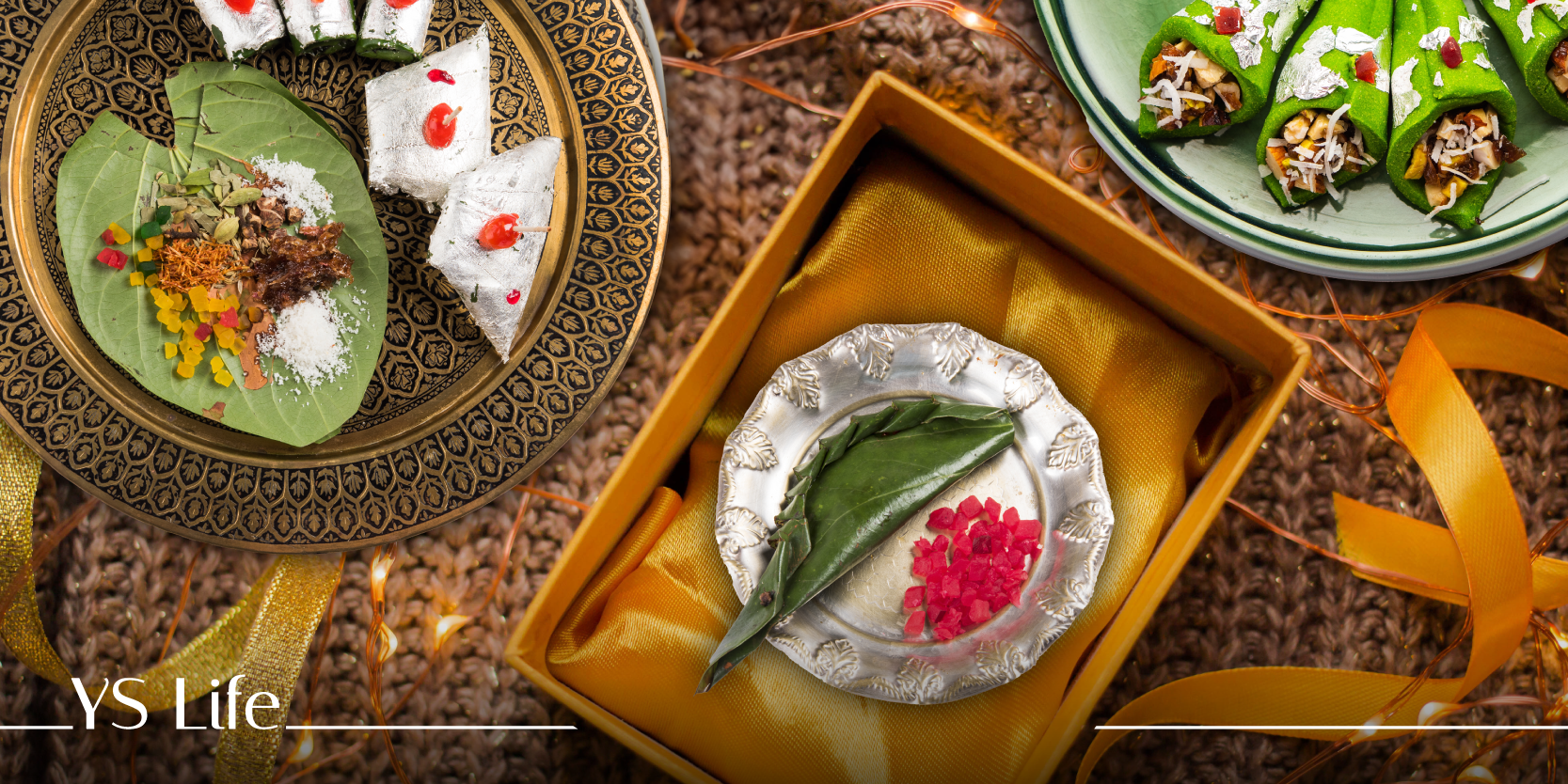The humble paan goes gourmet
The Indian post-meal treat has gotten a status lift with startups giving paan a premium edge besides chefs giving it a gourmet treatment.
Key Takeaways
- New-age startups are addressing the pain-points associated with the traditional way of buying and consuming paan
- Chefs are using unique ways to incorporate paan in gourmet dishes and cocktails
- Paan as the healthy Indian dessert
- The premiumisation of paan will not affect the local, road-side vendors
For most of us the consumption of paan or betel leaf was often associated with an occasion. It could be as casual as a weekend dinner at a restaurant, or as special as a cousin’s wedding. Paan always made its way post a good meal.
Ayurvedic practices also encourage its consumption, given that the leaf itself is enriched with nutrients that have some health benefits–functioning as an antiseptic, stimulant, breath-freshener and improving digestion.
“In ancient times, Rajas and Maharajas would offer paan to their guests as an extended hospitality,” says Prem Raheja, Founder and CEO of The Betel Leaf Co., a Bengaluru-based startup that sells premium paan.
Times have changed for the paan. According to the International Research Journal of Education and Technology, there are about 100 varieties of betel vine grown across the world, of which 40 varieties are found in India itself. While betel leaves have been cultivated since time immemorial, it assumed significant commercial importance in the last two to three decades. Over time, the consumption of paan has become a practice common for everyone.
The buying experience of paan, however, was far from being celebratory. Sold in street-side stalls, paan vendors do not limit their offerings to just the refreshing after-meal treat. The availability of tobacco-based products, gums, and mouth-fresheners, often attract patrons beyond the treat, making the paan-buying experience essentially male-dominated. As the association of paan with tobacco and nicotine grew, its status symbol as a royal after mint diminished.
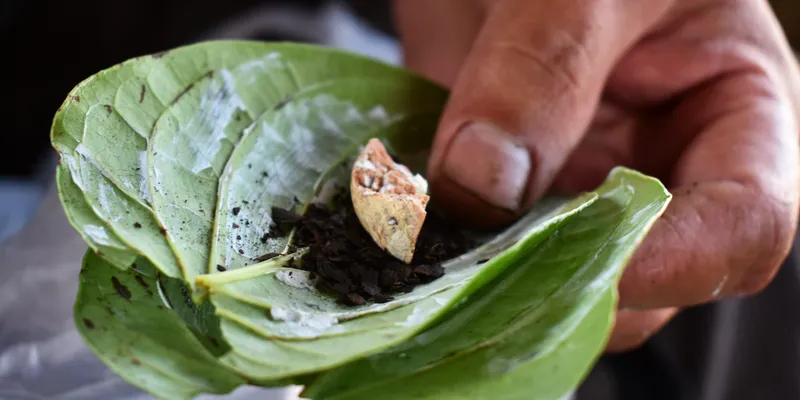
Paan | Image source: Shutterstock
Mulberry kofta to mul-jeera: Chefs are getting creative with the berry of winter!
In the last couple of years, however, it has been making a comeback, and in a new avatar. YS Life dives deeper into the evolution of paan.
Brands addressing pain-points
Businesses have popped up to address the several pain-points associated with buying paan. Be it The Betel Leaf Co., or US-based Mr Paanwala, brands are working hard to end its association with nicotine, and tobacco and in the process giving paan’s image and buying experience a hygienic and family-friendly facelift.
“When McDonald's can sell the same burger in Alaska and China, why can’t I do a recipe-based model that enables customers to buy paan that tastes the same everywhere, everytime?” says Raheja.
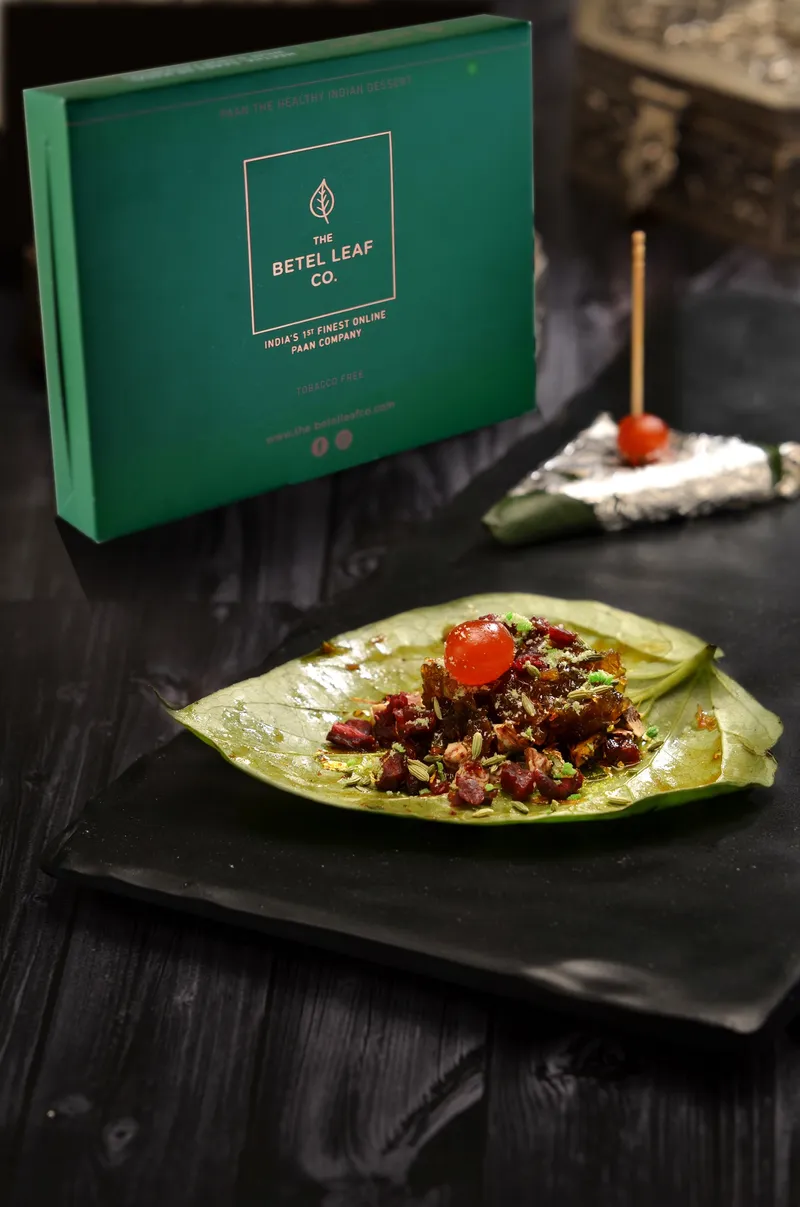
Meetha saada paan by The Betel Leaf Co.
Online-first The Betel Leaf Co. operates 40 dark kitchens across 17 Indian cities, delivering freshly-made paans to customers’ doors.
Mr Paanwala, however, works in a hybrid model, selling both online and offline. It has set up cafes, called Paan Casa, across 12 stores in India to provide a unique experience, in terms of quality and service.
“We use technology to track the order history of our repeat customers. As soon as they enter their phone numbers, we use AI to recommend alterations and modifications to previous orders, and also share personalised offers on WhatsApp,” says Mehul Patel, Founder of Mr Paanwala and Paan Casa, during a video interaction with YS Life.
Additionally, the brand operates four dark kitchens in India and has also tied up with Reliance Retail to sell pre-made paans in boxes of four.
But does that resonate with paan-enthusiasts?
For Nitu Chadda, a resident of Bandra-West, paan would be bought from local vendors of Juhu and Bandra. However, since her introduction to The Betel Leaf Co., she has been regular for the last two years.
“The cleanliness, hygiene and packaging are what attracted me and made me subscribe to their boxes. I do not consume tobacco and buying it from an established brand ensures that it is taken care of,” Chadda says.
For Bengaluru-based marketing research executive Dushyant Gupta, the introduction to premium paan was rather unique. “I was a part of an angel investors’ group on WhatsApp where Prem (Raheja) had pitched his products…While I did not directly invest in his company, I invested in the brand by becoming a regular customer,” he says.
Intrigued and fascinated by the product offerings, Gupta ordered a box for himself soon after the launch of The Betel Leaf Co. Today, he is a regular and orders two boxes of paan every two to three weeks, spending around Rs 800- Rs 1,ooo a month, on paan.
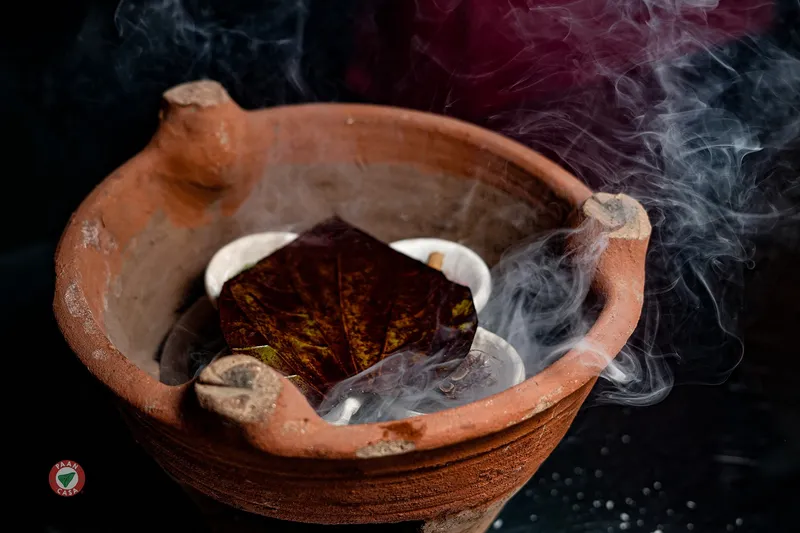
Ayurvedic tambula paan by Paan Casa. The paan leaves are heated inside a clay pot using charcoal, to activate its ingredients. Mr Paanwala claims that this activated paan helps in digestion
“You usually soil your hands after taking a paan outside its package and while putting it inside your mouth. The Betel Leaf Co., sends wet wipes to take care of that as well! It is this thoughtfulness that made me switch from the local vendors to them,” Gupta adds.
The gourmet touch
Paan is not just limited to being a post-meal treat anymore. Chefs across the country are figuring out unique ways to incorporate it into their creations.
“Betel leaves are visually appealing, making them a favourite among chefs who use it to enhance the presentation of their dishes,” says Chef Simran Singh Thapar, Executive Chef at The Leela Palace, Bengaluru. “It is a versatile ingredient and can be used in kebabs, chaats and desserts,” he adds.
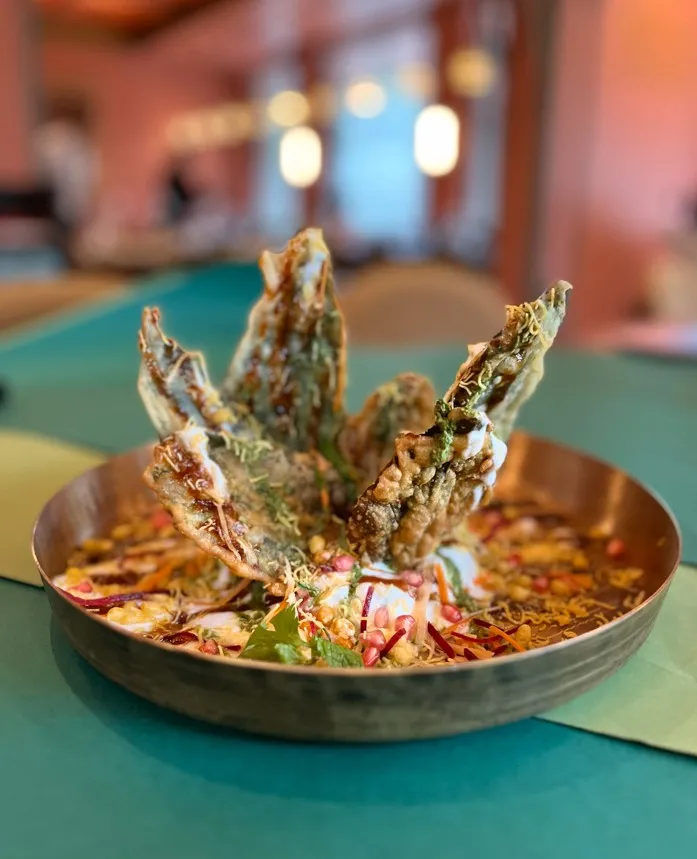
Palak and betel leaf chaat by Chef Vikram
Chef Thapar includes paan in his creation Paan Patte Ki Chaat—a type of crispy betel leaf fritters, “The result is mouth-watering, irresistible plate of chaat!,” he says. He also has a signature paan ice cream, churned in-house and infused with rose petal preserve or gulkhand.
“It has become a beloved choice among our guests, especially during social events hosted at our banquet facility,” Thapar adds. He also uses betel leaf to prepare biryani masala and special curry powders.
Similarly, Chef Monirul Sekh and Chef Khokan Molla of Kokum Bar and Lounge in Vasai, Maharashtra, use paan flavours, condensed milk, soaf and gulkhand to make a paan kulfi.
Chef Vikram, Culinary Director and Founder of Nksha Restaurant in Mumbai regularly serves paan kebab to their customers. Additionally, they also use betel leaf to give a twist to the classic margarita. “The spice in betel leaf compliments well with tequila and adds to the freshness,” Vikaram says.
Raheja takes things a notch further to revamp the concept of paan consumption and giving it a ‘healthy Indian dessert’ twist.
Before starting The Betel Leaf Co in July 2019, Raheja travelled across 15 Indian cities, sourcing the raw materials, and conducting 300 different trials before curating and finalising amenu with 45 variants. “We have dessert paan offerings aimed at fulfilling post-meal cravings but under 75 calories! These paans provide the same flavours as any dessert, are gluten-free and vegan, and offer the health benefits of a betel leaf,” Raheja tells YS Life.
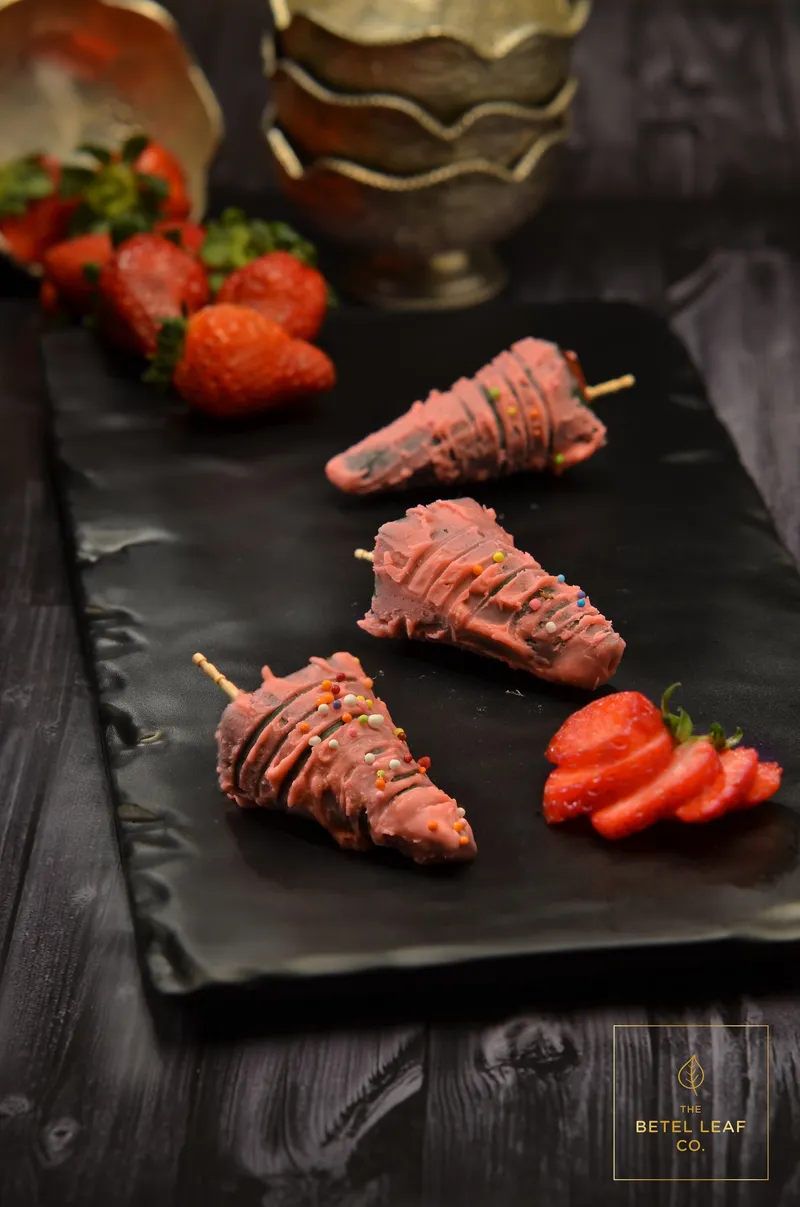
Strawberry coated meetha paan by The Betel Leaf and Co.
The Betel Leaf Co. makes its own in-house chutneys to be used inside the dessert paan, allowing the team to keep a check on the calorie count. For a tiramisu craving post an Italian meal, the brand offers a tiramisu and coffee-flavoured paan; and for Indian meals, it offers gulab jamun and ras malai-flavoured dessert paan. “Our paan does not essentially have a coffee or tiramisu or gulab jamun piece inside it. We create a similar flavour palette using the chutneys,” he addresses.
The brand has innovated to launch pocket-paan that comes with nine to 12 months of shelf-life, and can be carried around in a bag, like a chewing gum. It also claims to have launched the country’s first paan tea in four different flavours.
While Paan Casa tries focusing on the Ayurvedic health benefits of the betel leaf, it has expanded its portfolio to serve dessert paans–KitKat Crunch and 5Star Crunch, meetha (or sweet) paan shakes, 24Ct Gold paan, DIY-options, and paan shakes.
One of their unique offerings includes the ‘Honeymoon paan.’ “It comes in a container coated with 24Ct gold, and includes two paans, a bottle of itar and rose water. The paans are filled with ayurvedic herbs that are said to help with pregnancy,” Patels explains.
Priced at Rs 2,500 a box, each of the 12 Paan Casa stores sells at least two of these honeymoon paan packages during the off-season, and easily five to six honeymoon paan boxes during the wedding season.
Can paan establish itself in the premium category?
Mr Paanwala, originally started business in the US in 2014, and entered India in 2018. Despite the pandemic, the startup managed to expand all major cities in Gujarat and Orissa, Jaipur and Bengaluru. While it does not have a cafe in Mumbai, it delivers premium paan, priced between Rs 25 to Rs 2,500, through its dark kitchen. In 2022, the business generated about Rs 9 crore in India itself, generating a total of Rs 21 crore across India, US and Canada.
For The Betel Leaf Co., the sales stand at Rs 12 crore in FY 2022-23. “We look to open 70 to 75 kitchens by the end of March, 2024, generating Rs 30 crore in revenue,” Raheja reveals. Priced between Rs 30 to Rs 250 (approximately), the brand makes about 1,80,000 paans a month, across cities.
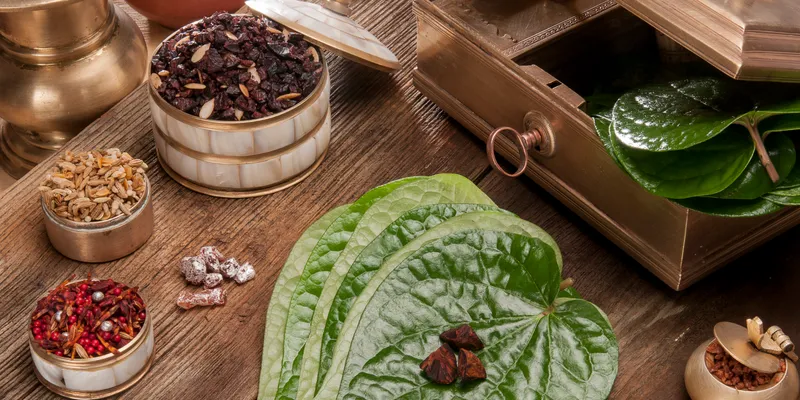
Image source: Shutterstock
“Our paans start from Rs 30, so why would a customer not want to buy it at the same price as a street-side vendor, but prepared hygienically, packed dutifully and delivered to their house? We are trying to take away the occasion-driven and price-point driven feature of paan by making it a regular dessert,” says Raheja.
But does the popularity of premium and branded paan direct towards the end of road-side vendors? Mostly no.
“The behavioural changes (in the buying pattern) is mostly a result of the pandemic. Since The Betel Leaf Co. was allowed to deliver during COVID-19, ordering and consuming paan at the end of a meal became a small in-house celebration, since paan has always been associated with eating out,” Gupta says.
However, “Every typical Indian restaurant continues to have a paan vendor in its vicinity. They are more like water-cooler locations where people gather to meet, chat and enjoy a little treat. Premium paan startups will never be able to replace these vendors,” he adds.
(The story was updated to change the sales numbers of The Betel Leaf Co.)
Edited by Akanksha Sarma






